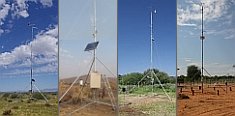Workpackages of Subproject E14
Workpackage WP14.1
The role of natural and secondary vegetation formations for rural livelihoods (Socio-economic impact of decreasing biodiversity)
Short description: Work package 1 will assess the socio-economic and agricultural production benefits derived from varying degrees of proximity of forest and other (semi-natural) vegetation forms. Equally, it will project the socio-economic impact of the loss of biodiversity to various user groups by analysing the importance of local resources for agricultural households, smallholders and small enterprises.
Workpackage WP14.2
Anthropogenic risk factors for maintaining biodiversity in rural areas despite continuing population growth
Short description: This work package will identify and predict the socio-economic pressures on biodiversity in the case study area. For this, the relevant human activities, resultant land-use changes and their impact on biodiversity will be investigated. The impacts will be analysed in terms of their temporal and spatial occurrence, responsible agents and future trends.
Workpackage WP14.3
Integrated rural development and sustainable management of biodiversity in anthropogenically-influenced land use systems
Short description: The last work package will assess and develop planning and management tools that reconcile the economic needs with ecological concerns by analyzing the existing local norms, governance structures and informal practices regarding land-use regulation and protection of natural resources and hence developing locally adapted models that integrate rural development and biodiversity sustainability.
| 





 Go to the WeatherNet
Go to the WeatherNet